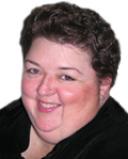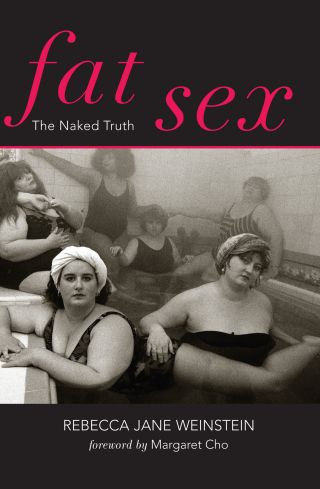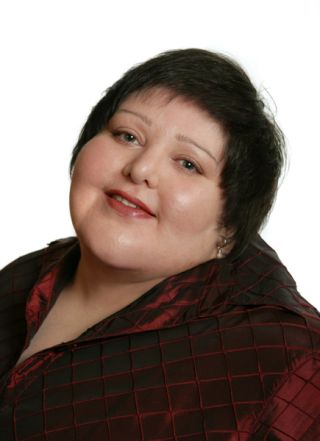
Sex
Adding Two Taboos Together Makes One Good Book
“Fat Sex” reveals that real people live behind spoiled identities
Posted August 29, 2012
Disclaimer: My husband, Carl Wilkerson, and I were interviewed for this book and our story is one of the chapters.
Fat Sex: The Naked Truth Rebecca Jane Weinstein

Fat Sex: The Naked Truth
Rebecca Jane Weinstein
The only two things everyone has in common in this collective memoir is fatness and sexuality. Not all folks are fat. Some love fat people but are not fat themselves. Not all folks are sexually active. But all have something to say about working out sexual issues and fat issues in a society that doesn’t really want to talk about either. This is why I found the project worthy of notice as a sociologist.
At the hear of stigmatization is the social belief that a group of people are less than human. Those who are deemed to belong to that group of people are deemed to be less than human by virtue of their belonging to the group. It is irrelevant if they actually belong to the group. It is a matter of how they are regarded by others. (What Erving Goffman called, a “social identity.”) If you are unlucky enough to find yourself in that social position, you understand all too well what Goffman meant by stigma being a “spoiled identity.”
In addition to never really getting away from a barrage of negative messages, you have to fight internalizing self-doubt. You are never really sure about your social relationships. Does that person really know me? Does this person really accept me or only tolerate me? When will the other shoe drop and I will see what they think about me? Was that giggle or sneer aimed at me or am I starting to imagine things after so many years of being bullied or shunned? Stigma creates a dysfunction in social interaction that is often beyond the control of the stigmatized person.
The word “dysfunction” is not a good word when thinking about sex. Sexual intimacy and the road to that intimacy requires the opposite of bullying, shunning, doubting and fear. Sex and stigma do not mix well at all. But sex is part of what makes us human. It is not surprising that part of the rhetoric of stigmatizing a group involves acclamations about the sex lives of the members of the group. To recognize a group of people as sexual beings is to recognize them as human beings. To discount their sexuality is part of the process of dehumanizing them.
What I like most about Fat Sex is that instead of a clinical, psychological or sociological account attempting to disprove the negative, the book relies simply upon the human voice to show the humanity. I studied qualitative methods from one of the most well-known qualitative researchers in sociology, Dr. Jaber Gubrium. He once told us that ethnography was most useful as a disproof rather than proof. By that he meant, if a belief about a group is expressed universally (“they all do fill-in-the-blank”) then a single exception puts a lie to the whole notion. Once you recognize that some people in a group do not behave along the lines of the stereotype, you have to make room for the possibility that the stereotype is wrong.
Thus, reading Fat Sex has the potential to explode myths and tear down stereotypes. That alone makes it worth the read.

Rebecca Jane Weinstein
I have the honor of knowing Weinstein, her work at PeopleofSize.com, and of being a part of the book. This gave me a chance to discuss the work with her and ask her some specific questions and to watch how the project has progressed. Overall, I’ve been pleased with the reception the book has received from the planning stages through to now. I think it is a positive sign that this book has been accepted as much as it has, though my hope is that more people will read it and support the future endeavors it is birthing.
One of the first good signs, was that Weinstein was able to raised $5000 for the book’s production through Kickstarter, a financial backing website for creative projects. Weinstein explained:
I had a tremendous amount of support, not just in the form of contributions, but enthusiasm and excitement. Both fat and non-fat people wanted to see this book happen. Fat and sex touch everyone. I was lucky enough to get the attention of Margaret Cho, who is a very outspoken advocate in the LGBT community, and also about body image. Of course if you have ever seen her standup, obviously sex is a topic she discusses a lot. She contributed a great Foreword to the book and was helpful in getting me through the last push in Kickstarter funding.
The support that the book received may signal a change both in attitudes about fat and about sex, at least a tiny bit of hope. Reception since the book became available has been positive, with Weinstein appearing on radio and TV shows nationwide, including two wonderful segments on NBC’s Today Show.
Weinstein also reports that the reception has been mostly positive from people who have contacted her:
I have been contacted by many people, the vast majority are positive and supportive. The interest comes from many unexpected places. It is not just fat people who care about this book, though of course people in the size acceptance community have been outstanding. But also those in the eating disorder community, LGBT, and just regular people from no particular community at all. Average size women, and even more surprisingly, men, are very interested in this work. I have found that men are far more affected by body image issues than is often discussed.
Though, as she explains, this work has met resistance, as would any stigma-busting work:
There have also been people who are critical of me and the work. The criticism is, to me, bizarre. A peculiar obsession with other people’s bodies and personal lives, that frankly is completely out of place. I have encountered people who are less than nice about the book and me personally. Everything about this book makes me and the people in it vulnerable, and some misguided individuals try to capitalize on that. I try not to make it my problem. Anyone with any sense of humanity and respect will recognize that all people have a right to happy and fulfilling relationships.
I am not an expert on all the world’s pathologies. There is that very common cliché that people are mean because they are unhappy with themselves. I’m sure it is more complicated than that, but there is probably a fair amount of truth to it too. Some people prey on the vulnerable. That’s a good reason to fight against vulnerability and challenge ourselves to be strong, regardless of our circumstances. I try to be more an observer than a judge, some people are just assholes.
What is most exciting to me, however, is that the next step in the project is going to be a stage production:
I have believed from the beginning that these stories would be perfect to adapt for the stage, sort of in the spirit of the Vagina Monologues. They are moving and funny, and very relatable. Also, focused primarily on storytelling, it would be the kind of production that could be done anywhere, with a very small or even no budget – on a stage or even in a basement. This is accessible theater in every sense of the word.
The point of the book is to connect, to humanize, and to demonstrate that there is a universality to these issues. There is no better way to do that than in a group of people. As far as roles for “fat actors,” obviously it is a tough business, even if you fit the stereotypical ideal. I aim to support people of size in making their goals come true, and this is one small way I can help do that. As well, I was a kid actor. I was a professional child actor in NYC from the age of 9-14. I was turned down by agents because I was a fat kid. I was made to feel uncomfortable in the theater company I belonged to because of my size. Costumes had to be made especially for me, and ultimately I left a company I loved because I was too ashamed to wear the form-fitting costume for the coming show. It is a major life regret. I don’t perform anymore, but I still have a piece of my heart in theater, and love behind the scenes.
So buy the book, read the book and then get involved by helping to bring the book to the stage. Fighting a stigma is, in part, fighting a social attitude and helping dispel inaccurate information about a group of people. It involves more than a change of law, or even a change of rhetoric (though both can be useful). It involves a change in heart. The opposite of stigma is social empathy. Instead of imposing one’s ideas about the lives of members of a group, one listens and tries to the see the world through the eyes of another person. Storytelling (and listening to other’s stories) is one of the oldest and best ways to promote empathy.



